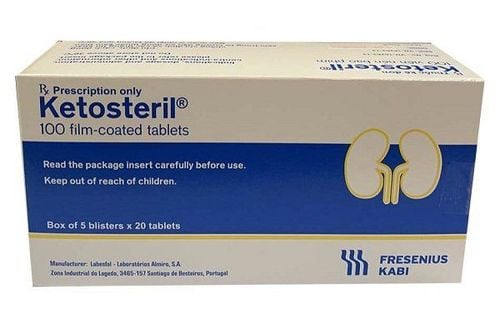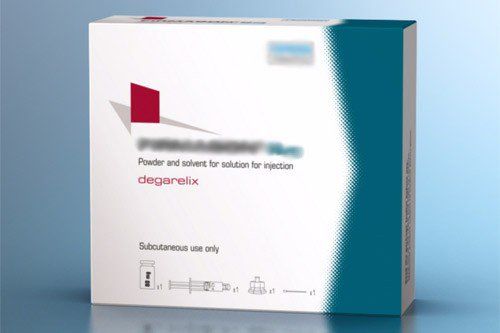This is an automatically translated article.
Elaprase is a concentrated solution for intravenous infusion, each containing Idursulfase 6mg / 3ml. Elaprase is indicated for the treatment of patients with Hunter syndrome. Let's find out more details about the effects, as well as how to use and dosage of Elaprase through the following article.
1. What is Elaprase?
Elaprase is an IV fluid used to treat some symptoms of Hunter syndrome, also known as Mucopolysaccharidosis (MYOO-koe-pol-ee-SAK-a-rye-DOE-sis). Elaprase is made up of Idursulfase, a purified form of human Iduronate-2-sulfatase, the lytic enzyme that some people lack due to a genetic disorder. Elaprase is a therapy to help replace this missing enzyme.
Hunter syndrome is a metabolic disorder in which the body lacks the enzymes needed to break down certain sugars and proteins. These substances can build up in the body, causing enlarged organs, abnormal bone structure, changes in facial features, decreased vision, heart and respiratory problems, and changes in ability to function. mental or physical ability. Elaprase is prepared in the form of a concentrated solution for intravenous infusion, each 3ml vial contains Idursulfase 6mg/3ml and excipients such as sodium chloride, sodium phosphate dibasic heptahydrate, sodium phosphate monobasic monohydrate, polysorbate 20 and distilled water for injection just enough for 1 vial.
2. What should be noted before using Elaprase?
Before using Elaprase, you need to tell your treating doctor if:
You have an infection or a fever. History of heart or lung disease. Previous unusual or allergic reaction to Idursulfase, other drugs, foods, dyes or preservatives. Swollen tongue, face or lips accompanied by difficulty breathing, swallowing, hoarseness,... Women who are pregnant or planning to become pregnant during treatment with Elaprase. Breastfeeding women.
3. How to use, dose of Elaprase
How to use:
Elaprase is prepared for injection, slowly infused through an intravenous line. The transfer may take up to 3 hours or longer to complete. Elaprase is usually given once a week. Your doctor may also prescribe other medicines to help prevent an allergic reaction to Idursulfase. Take all medications as directed by your doctor. Your doctor will need to check your progress on a regular basis while using Elaprase. For parenteral drugs, check that the vial cap is intact, particles or solution are discolored. Do not use Elaprase injection past the expiry date indicated on the package. Store Elaprase in a container at 2-8°C, do not freeze or shake, protect from light. After dilution of Elaprase with isotonic solution, the bag must be infused immediately because Elaprase does not contain preservatives. In case it cannot be used immediately, the reconstituted solution must be stored in the refrigerator at 2-8°C for up to 24 hours. Dosage:
Usual Adult Dose for Mucopolysaccharidosis Type II: 0.5mg/kg by intravenous infusion once weekly. Usual Pediatric Dose for Mucopolysaccharidosis Type II: 16 months and older: 0.5mg/kg by intravenous infusion once weekly Improves walking ability in patients 5 years of age and older, demonstrated . There are no data showing improvement in disease-related symptoms or long-term clinical outcomes in patients aged 16 months to 5 years; however, similar to that in patients 5 years of age and older with reduced spleen volume. What to do if you miss a dose of Elaprase?
If you miss your appointment for Elaprase injection, call your treating doctor for advice.
The correct dose of injection helps to achieve a good treatment effect, so keep the appointment for Elaprase injection to avoid missed doses.
What to do when you overdose Elaprase?
Elaprase is injected by medical professionals at the treatment facility so an overdose is unlikely.
4. What are the side effects when using Elaprase?
During the Elaprase infusion or up to 24 hours afterwards, some side effects may occur. Get medical help right away if you have any of these signs of an allergic reaction to Elaprase: fainting, hives, difficulty breathing, convulsions, swelling of your face, lips, tongue, or throat .
If you have ever had an allergic reaction to Idursulfase, you will be closely monitored after Elaprase injection.
Common side effects of Elaprase may include: Vomiting, diarrhea, headache, muscle or joint pain, cough, itching, rash, or flushing (hot, red, or tingling sensation).
During the use of Elaprase, if you experience any unusual signs other than the above side effects, please contact your treating doctor immediately for medical attention.
5. Elaprase interactions with other products
No formal drug product interaction studies have been performed with Idursulfase. Based on the metabolism of Idursulfase in cellular lysosomes, Idursulfase itself is an enzyme, so cytochrome P450-mediated interactions are unlikely. Above is information about the uses, dosage and precautions when using Elaprase. To ensure safety for your health and maximize the effectiveness of your treatment, you need to take Elaprase exactly as directed by your doctor.
Please dial HOTLINE for more information or register for an appointment HERE. Download MyVinmec app to make appointments faster and to manage your bookings easily.













